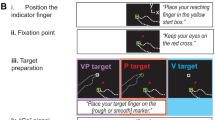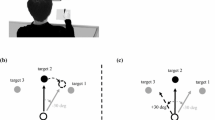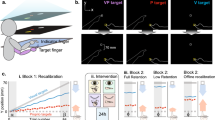Abstract
It has been shown before that sensorimotor adaptation to rotated vision is more generalized when subjects point at eight, rather than at four or less targets. Here we evaluate whether an even more variable practice has additional benefits. One group of subjects pointed at eight targets, and another group executed unconstrained arm movements throughout the workspace. We found no advantage of the latter group with respect to adaptive progress, persistence of adaptation without visual feedback, or transfer of adaptation to a new motor task. We therefore concluded that eight targets are sufficient to yield generalized adaptation. To determine the role of declarative knowledge for sensorimotor adaptation, subjects from both above groups were questioned regarding the nature of the distortion after they completed the experiment. We found that correct responders showed better adaptive progress, more persistence, but the same transfer as incorrect responders. We therefore concluded that the benefit of declarative knowledge is task-specific and short-lived, and is therefore probably related to strategic control rather than to an adaptive recalibration of the sensorimotor system.

Similar content being viewed by others
Notes
This characteristic was defined by calculating the standard deviation of starting point along the x and y axis, sx and sy, and then calculating the area of an ellipse with those standard deviations as half-axes, i.e., π*sx*sy.
References
Abeele S, Bock O (2003) Transfer of sensorimotor adaptation between different movement categories. Exp Brain Res 148:128–32
Bock O (1992) Adaptation of aimed arm movements to sensorimotor discordance: evidence for direction-independent gain control. Behav Brain Res 51:41–50
Bock O (2005) Components of sensorimotor adaptation in young and elderly subjects. Exp Brain Res 160:259–63
Buch ER, Young S, Contreras-Vidal JL (2003) Visuomotor adaptation in normal aging. Learn Mem 10:55–63
Flanagan JR, Nakano E, Imamizu H, Osu R, Yoshioka T, Kawato M (1999) Composition and decomposition of internal models in motor learning under altered kinematic and dynamic environments. J Neurosci 19:RC34
Gentile A (1998) Implicit and explicit processes during acquisition of functional skills. J Occupat Ther 5:7–16
Graydon FX, Friston KJ, Thomas CG, Brooks VB, Menon RS (2005) Learning-related fMRI activation associated with a rotational visuo-motor transformation. Brain Res Cogn Brain Res 22:373–83
Hodges NJ, Franks IM (2001) Learning a coordination skill: interactive effects of instruction and feedback. Res Q Exerc Sport 72:132–42
Honda M, Deiber MP, Ibanez V, Pascual-Leone A, Zhuang P, Hallett M (1998) Dynamic cortical involvement in implicit and explicit motor sequence learning. A PET study. Brain 121(Pt 11):2159–73
Krakauer JW, Pine ZM, Ghilardi MF, Ghez C (2000) Learning of visuomotor transformations for vectorial planning of reaching trajectories. J Neurosci 20:8916–24
Masters R (1992) Knowledge, knerves, and know-how. Brit J Psychol 83:343–58
Mazzoni P, Krakauer JW (2006) An implicit plan overrides an explicit strategy during visuomotor adaptation. J Neurosci 26:3642–5
McCracken H, Stelmach G (1977) A test of the schema theory of discrete motor learning. J Motor Behav 9:193–201
McNay EC, Willingham DB (1998) Deficit in learning of a motor skill requiring strategy, but not of perceptuomotor recalibration, with aging. Learn Mem 4:411–20
Orrell AJ, Eves FF, Masters RS (2006) Implicit motor learning of a balancing task. Gait Posture 23:9–16
Redding G (1996) Adaptive spatial alignment and strategic perceptual-motor control. J Exp Psychol: Hum Percept Perform 22:379–94
Redding G, Rossetti Y, Wallace B (2005) Applications of prism adaptation: a tutorial in theory and method. Neurosci Biobehav Rev 29:431–44
Redding GM, Wallace B (1996) Adaptive spatial alignment and strategic perceptual-motor control. J Exp Psychol Hum Percept Perform 22:379–94
Shea CH, Kohl RM (1991) Composition of practice: influence on the retention of motor skills. Res Q Exerc Sport 62:187–95
Slachevsky A, Pillon B, Fourneret P, Renie L, Levy R, Jeannerod M, Dubois B (2003) The prefrontal cortex and conscious monitoring of action: an experimental study. Neuropsychologia 41:655–65
Acknowledgments
This work was supported by DGF grant Bo 649/8, and grant 50WB9942 from the “Deutsche Zentrum für Luft- und Raumfahrt e.V. (DLR) funded by the German Ministry for Education and Research; both awarded to the second author. Thanks are due to Dr. J. Krakauer for comments on an earlier version of this paper.
Author information
Authors and Affiliations
Corresponding author
Rights and permissions
About this article
Cite this article
Werner, S., Bock, O. Effects of variable practice and declarative knowledge on sensorimotor adaptation to rotated visual feedback. Exp Brain Res 178, 554–559 (2007). https://doi.org/10.1007/s00221-007-0925-0
Received:
Accepted:
Published:
Issue Date:
DOI: https://doi.org/10.1007/s00221-007-0925-0




